Every year, the National Testing Agency publishes information about the NEET Examination. National Eligibility Entrance Test is an acronym for National Eligibility Entrance Test. The Indian Medical Council has made all vital details and information about the exam public. In 2021, about 14,10,800 hopefuls applied for the NEET exam, according to data. Only 7,87,042 were chosen for the qualifying stage out of the entire group. The NEET is an important exam for anyone interested in pursuing a profession in medicine or dentistry.
Every exam has distinctive characteristics that candidates should be aware of. The same can be said with NEET. Aspirants should be informed with the eligibility requirements, question format, exam highlights, and syllabus.
Eligibility Criteria for NEET
- The NEET eligibility criteria for the year 2021 are as follows: The NEET test is required for Indian/Overseas aspirants who wish to be admitted to medical universities and institutions in India.
- Students in general must be between the ages of 17 and 25. (on or before 31st December of the same year). The age restriction for SC/ST/OBC/PWD is fixed at 17 to 30 years.
- Seats from the All-India Quota: Under the entire 15 percent All India Quota seats, foreign candidates and Overseas Citizens of India (OCI), NRIs, and Persons of Indian Origin (PIO) are eligible for reservation. Candidates from J&K, on the other hand, are not eligible for the 15% All India Quota.
- Every candidate who wishes to sit for the exam must have completed their class 12 board examination.
- A B.Sc. in any two of Physics, Chemistry, Biology (Botany, Zoology), or Biotechnology from a reputable Indian university is required.
- They must have completed the first year of a three-year PCB degree program at the university.
- Number of Attempts – All applicants are allowed to take the NEET test as many times as they like until they reach the required age.
Syllabus for NEET examination
Here is a detailed look at the NEET Syllabus. All the students are required to follow the below mentioned syllabus properly:
1. NEET Chemistry Syllabus
a. Class XI
- Some Basic Concepts of Chemistry
- Structure of Atom
- Classification of Elements and Periodicity in Properties
- Chemical Bonding and Molecular Structure
- States of Matter: Gases and Liquids
- Thermodynamics
- Equilibrium
- Redox Reactions
- Hydrogen
- s-Block Element (Alkali and Alkaline earth metals)
- Some p-Block Elements
- Organic Chemistry- Some Basic Principles and Techniques
- Hydrocarbons
- Environmental Chemistry
b. Class XII
- Solid State
- Solutions
- Electrochemistry
- Chemical Kinetics
- Surface Chemistry
- General Principles and Processes of Isolation of Elements
- p- Block Elements
- d and f Block Elements
- Coordination Compounds
- Haloalkanes and Haloarenes
- Alcohols, Phenols and Ethers
- Aldehydes, Ketones and Carboxylic Acids
- Organic Compounds Containing Nitrogen
- Biomolecules
- Polymers
- Chemistry in Everyday Life
2. NEET 2021 Physics Syllabus
a. Class XI
- Physical world and measurement
- Kinematics
- Laws of Motion
- Work, Energy and Power
- Motion of System of Particles and Rigid Body
- Gravitation
- Properties of Bulk Matter
- Thermodynamics
- Behavior of Perfect Gas and Kinetic Theory
- Oscillations and Waves
b. Class XII
- Electrostatics
- Current Electricity
- Magnetic Effects of Current and Magnetism
- Electromagnetic Induction and Alternating Currents
- Electromagnetic Waves
- Optics
- Dual Nature of Matter and Radiation
- Atoms and Nuclei
- Electronic Devices
3. NEET 2021 Biology Syllabus
a. Class XI
- Diversity in Living World
- Structural Organization in Animals and Plants
- Cell Structure and Function
- Plant Physiology
- Human physiology
b. Class XII
- Reproduction
- Genetics and Evolution
- Biology and Human Welfare
- Biotechnology and Its Applications
- Ecology and environment
Important topics, chapters, and subjects for NEET examination
Given below is the detailed description of all the Important Questions of NEET Units and Measurements, kindly go through it for better reference:
1. Physics
Physics often gives a tough time to the students and hence this subject should be prepared very well. Some of the most important topics of Physics for the NEET exam are as discussed.
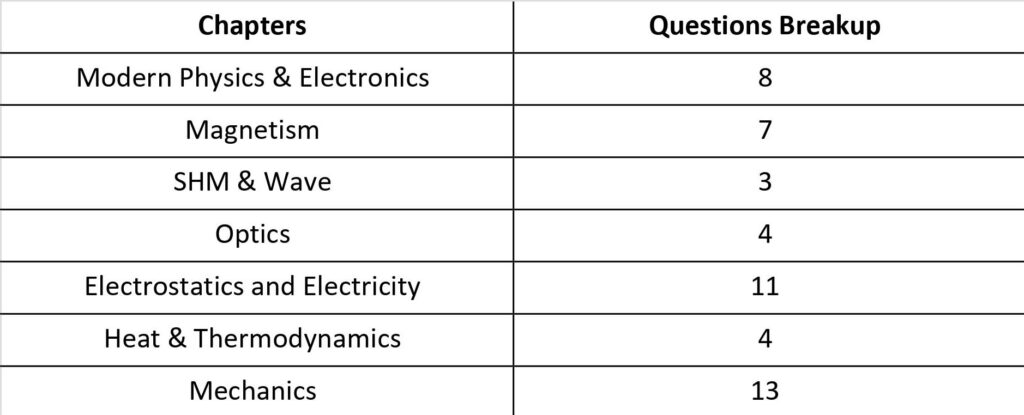
Important Topics – NEET, Weightage – Number of Questions Asked
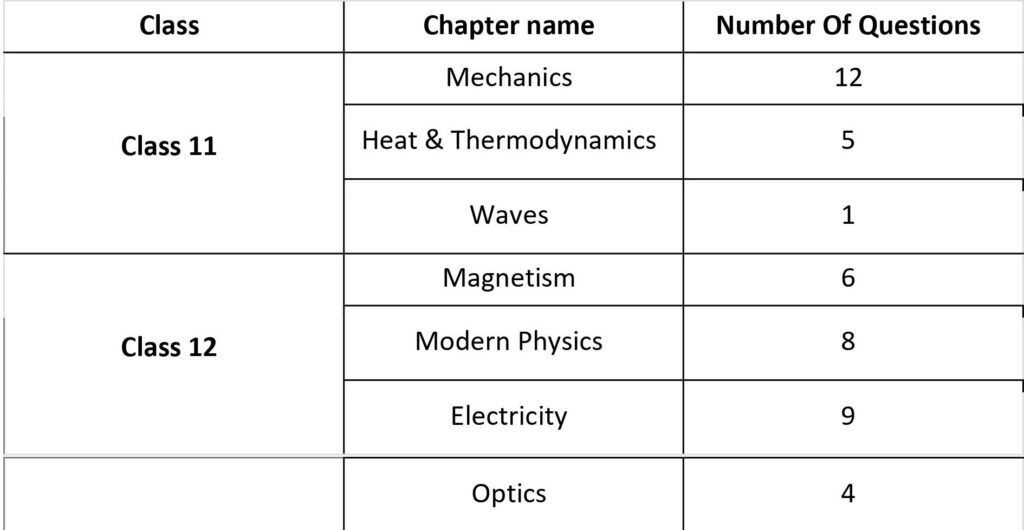
Listed below are important chapters for NEET-UG along with the average number of questions asked in the NEET Exam from that topic based on previous trends. This can help the candidates to be a step ahead with the preparation.
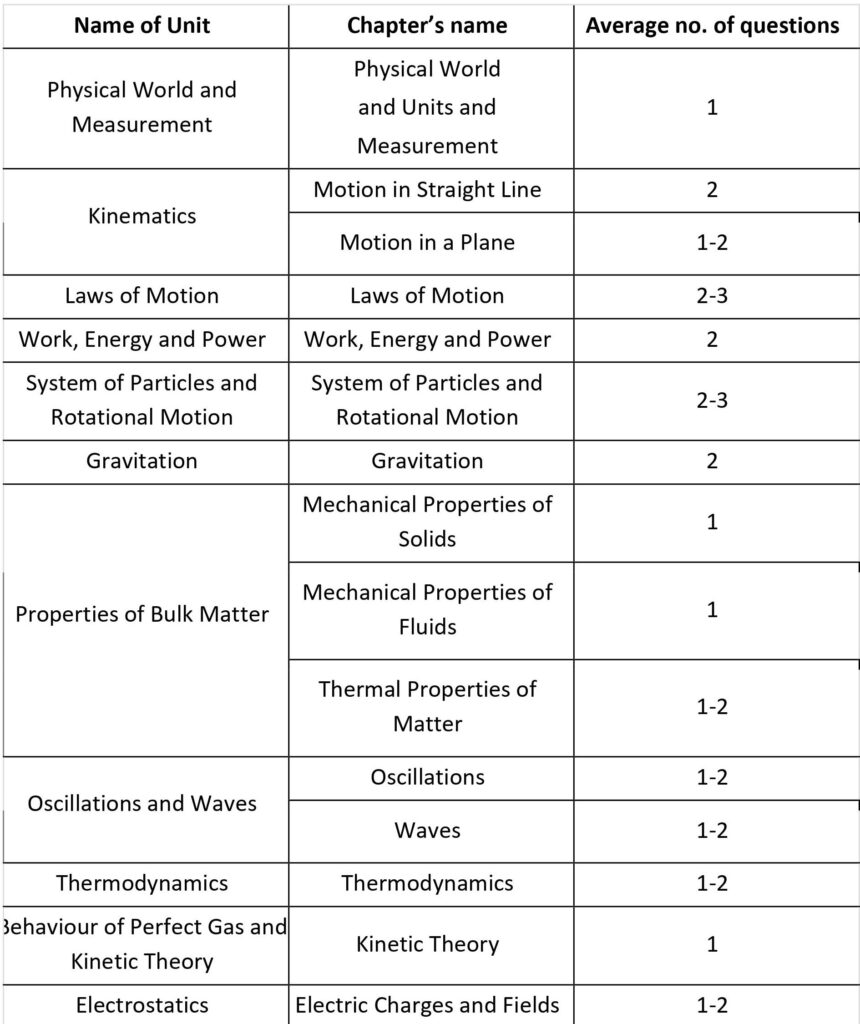

2. Chemistry – Important Topics for NEET Chemistry 2021
| Chemistry Sections | Questions Breakup |
| Inorganic Chemistry | 19 |
| Organic Chemistry | 15 |
| Physical Chemistry | 16 |
A detailed breakup of the number of questions for each chapter of Chemistry is as follows –
Physical Chemistry
| Chapter | No. of Questions |
| Solid state | 2 |
| States of matter | 2 |
| Thermodynamics | 1 |
| Electrochemistry | 2 |
| Surface chemistry | 1 |
| Solutions | 2 |
| Chemical Kinetics | 2 |
| Nuclear Chemistry | 1 |
| Mole concept | 1 |
| Atomic structure | 1 |
| Ionic equilibrium | 1 |
Inorganic Chemistry
| Chapter | No. of Questions |
| Chemical Bonding | 5 |
| s-block | 2 |
| p-block | 3 |
| d and f block | 2 |
| Metallurgy | 2 |
| Environmental chemistry | 1 |
| Coordination chemistry | 2 |
Organic Chemistry
| Chapter | No. of Questions |
| Some basic principles and techniques | 1 |
| Hydrocarbons | 4 |
| Haloalkanes and Haloarenes | 2 |
| Alcohol, Phenol and Ether | 1 |
| Carbonyl compound | 3 |
| Amine | 2 |
| Biomolecules | 1 |
| Polymers | 1 |
| Chemistry in Everyday Life | 1 |
The chemistry section constitutes questions that are less tricky and hence this section becomes the scoring area at NEET. Important topics from NEET chemistry include:
NEET 2020 Chemistry Weightage – Number of Questions Asked
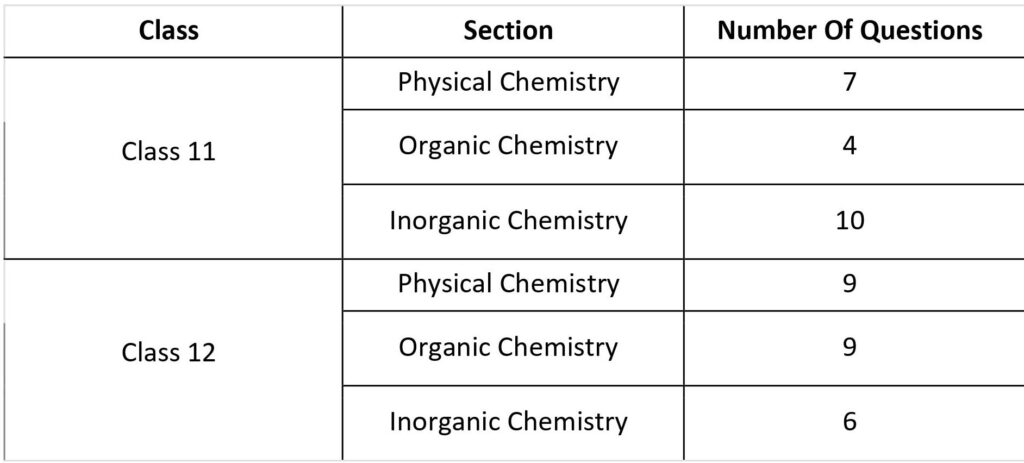
NEET Chemistry Class 11 and Class 12
The following table depicts important chapters for NEET-UG along with the average number of questions asked in the NEET Exam from that topic based on previous trends.
| Chapter’s name | Average no. of questions |
| Hydrogen | 1 |
| s-Block Element (Alkali and Alkaline earth metals) | 2 |
| Some p-Block Elements | 1 |
| Chemical Bonding and Molecular Structure | 3 |
| Classification of Elements and Periodicity in Properties | 1 |
| General Principles and Processes of Isolation of Elements | 1 |
| p- Block Elements | 2-3 |
| d and f Block Elements | 2 |
| Coordination Compounds | 2 |
| Environmental Chemistry | 1 |
| Organic Chemistry- Some Basic Principles and Techniques | 1-2 |
| Hydrocarbons | 3 |
| Haloalkanes and Haloarenes | 2 |
| Alcohols, Phenols and Ethers | 1-2 |
| Aldehydes, Ketones and Carboxylic Acids | 2-3 |
| Organic Compounds Containing Nitrogen | 1 |
| Biomolecules | 2 |
| Polymers | 1-2 |
| Chemistry in Everyday Life | 1 |
| Some Basic Concepts of Chemistry | 1-2 |
| Structure of Atom | 2 |
| States of Matter: Gases and Liquids | 1 |
| Thermodynamics | 2 |
| Equilibrium | 2-3 |
| Redox Reactions | 1 |
| Solid State | 1-2 |
| Solutions | 2 |
| Electrochemistry | 2 |
| Chemical Kinetics | 2 |
| Surface Chemistry | 1 |
By preparing these topics, candidates can easily score well in chemistry and can increase their overall score at the exam.
3. Biology – Important Topics for NEET Biology
Being a medical entrance test, biology is the most important section for the NEET Exam. The question paper comprises both the zoology and botany sections. Some of the important chapters of NEET biology are given here:
| Chapter | No. of Questions |
| The Living World | 1 |
| Biological Classification | 1 |
| Plant Kingdom | 5 |
| Animal Kingdom | 4 |
| Morphology of Flowering Plants | 2 |
| Anatomy of Flowering Plants | 3 |
| Structural Organization in Animals | 3 |
| Cell: The Unit of Life | 2 |
| Biomolecules | 3 |
| Cell Cycle and Cell Division | 7 |
| Transport in Plants | 1 |
| Photosynthesis in Higher Plants | 4 |
| Respiration in Plants | 1 |
| Plant Growth and Development | 3 |
| Digestion and Absorption | 2 |
| Breathing and Exchange of Gases | 3 |
| Body Fluids and Circulation | 3 |
| Locomotion and Movement | 4 |
| Sexual Reproduction in Flowering plants | 3 |
| Human Reproduction | 3 |
| Reproductive Health | 3 |
| Principles of Inheritance and Variation | 2 |
| Molecular Basis of Inheritance | 10 |
| Evolution | 1 |
| Human Health and Disease | 3 |
| Strategies for Enhancement in Food Production | 3 |
| Microbes in Human Welfare | 1 |
| Biotechnology: Principles and Processes | 6 |
| Biotechnology and its Applications | 5 |
| Organisms and Populations | 4 |
| Ecosystem | 3 |
| Environmental Issues | 1 |
Important Topics – NEET Botany Weightage – Number of Questions Asked
Botany
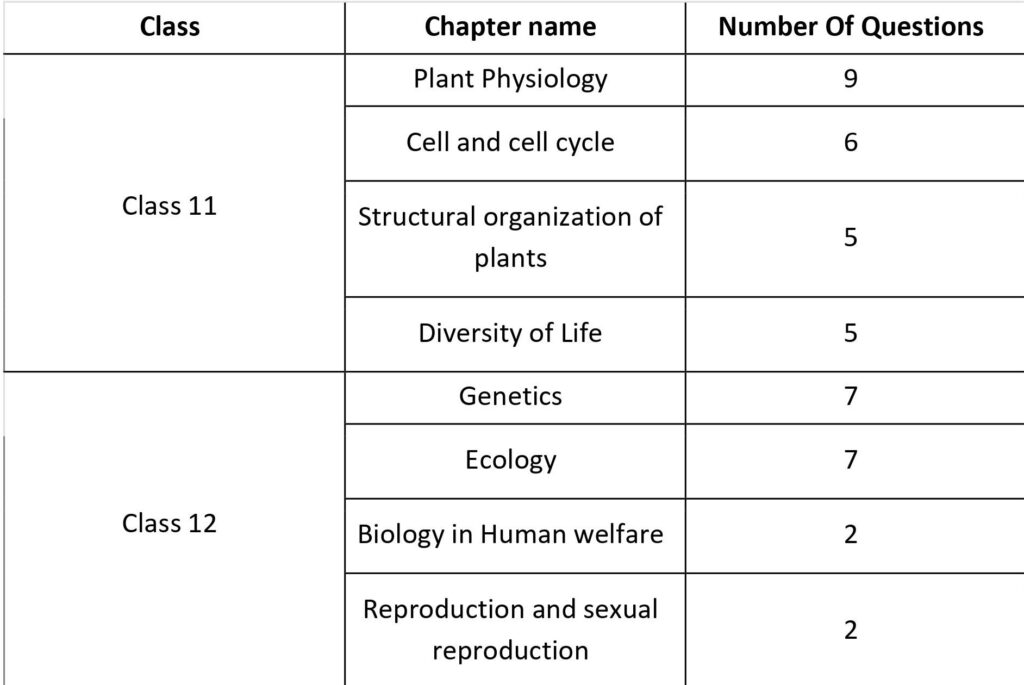
Zoology
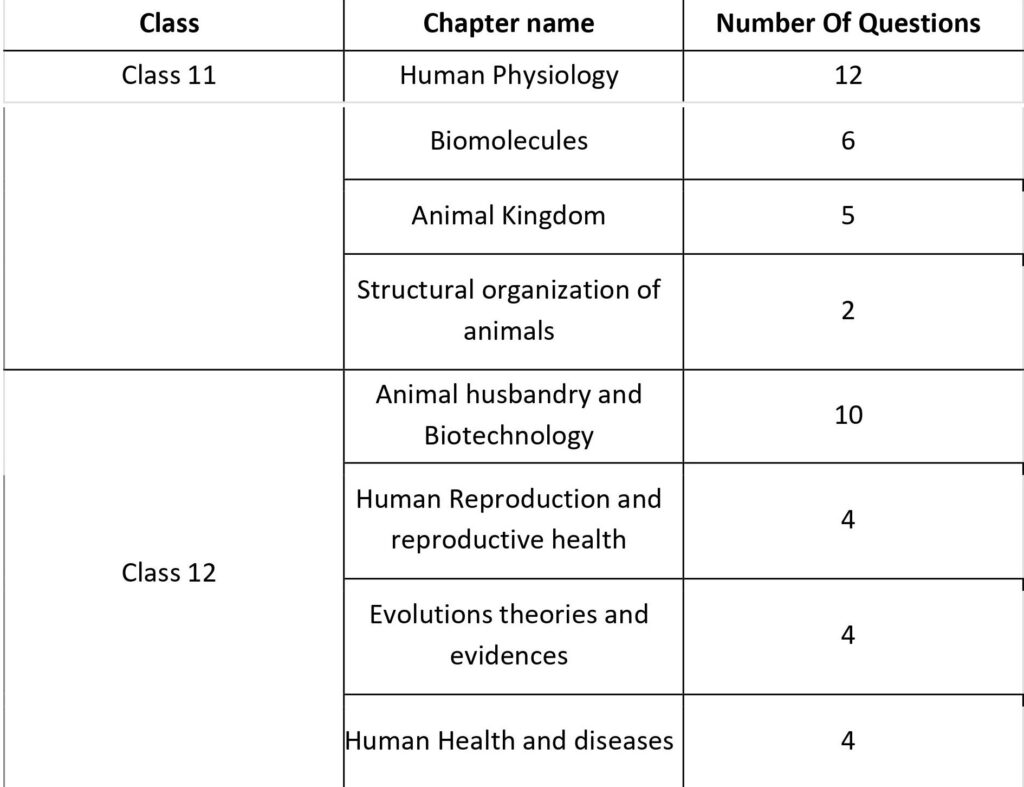
The following table indicates chapters and the corresponding, average number of questions asked from them based on previous NEET trends.
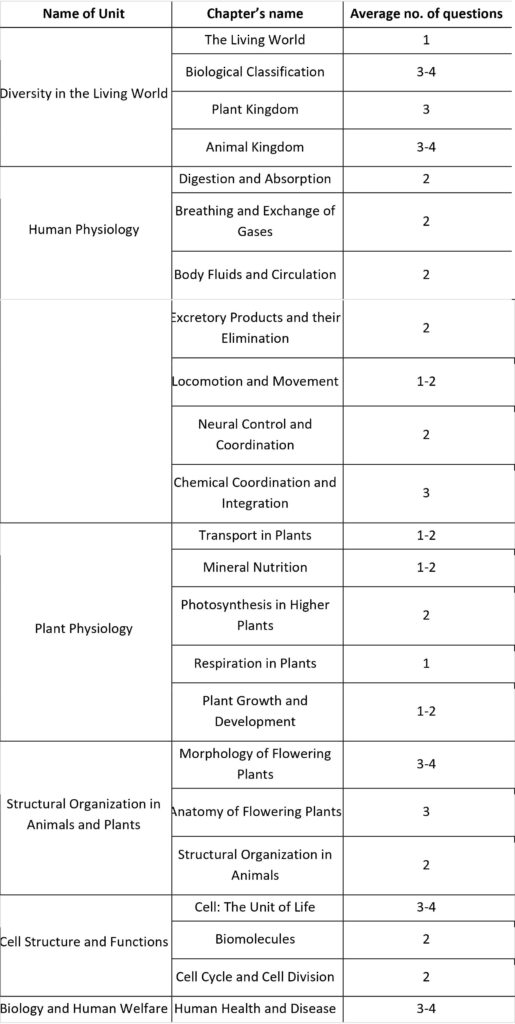
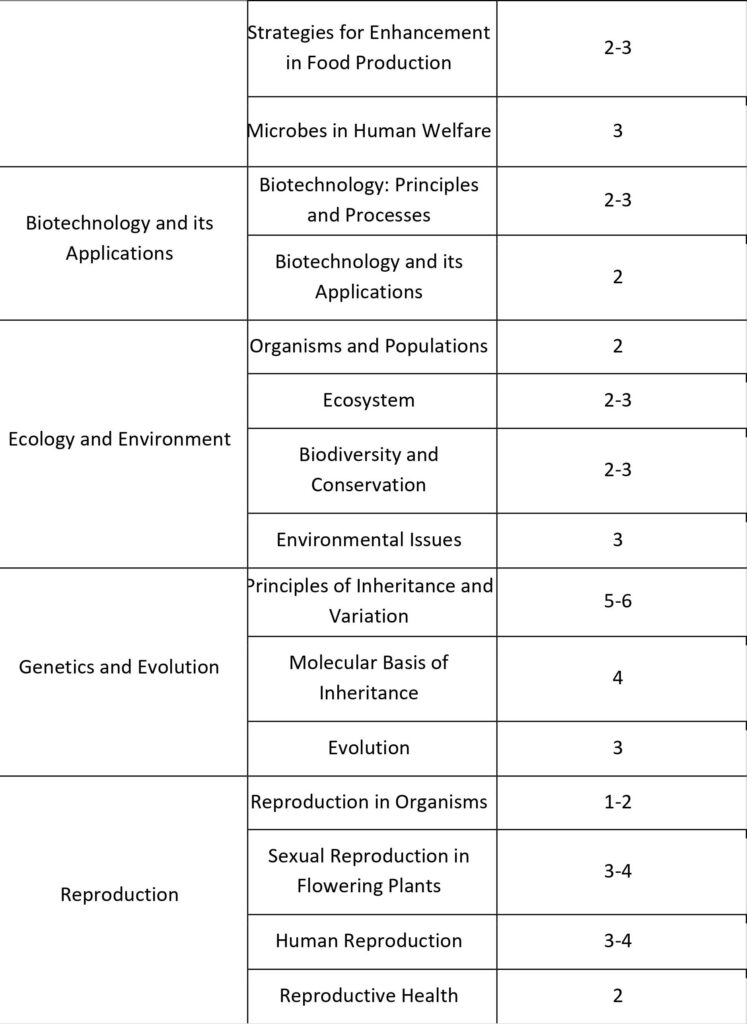
Conclusion
The National Eligibility and Entrance Test (NEET) stands for National Eligibility and Entrance Test. This entrance examination will be administered by the National Testing Agency beginning in 2019. It takes place once a year. The NEET test is open to any eligible candidate who wishes to be a doctor or wants to pursue a career in medicine. The unreserved category allows for a maximum of nine attempts. The reserved category allows for a maximum of fourteen attempts. Before registering for an exam, a candidate should review the curriculum, examination format, and other requirements. The crucial dates for the examination must be remembered by the candidate.
Frequently Asked Questions (FAQs)
- What is accounting NCERT Class 11 ?
- The NEET 2020 exam will last three hours. Furthermore, there will be a total of 180 questions for a total of 720 points.
- How many sections does the NEET Exam have ?
- This exam is divided into three sections, including physics, chemistry, and biology. There are 45 questions in each of the physics and chemistry sections. The biology portion, on the other hand, comprises 90 questions.
- What will this exam’s marking scheme be ?
- This exam’s marking scheme is +4 for each correct answer and -1 for each incorrect answer. Unanswered questions, on the other hand, do not result in a deduction of marks.

Namaste UI collaborates closely with clients to develop tailored guest posting strategies that align with their unique goals and target audiences. Their commitment to delivering high-quality, niche-specific content ensures that each guest post not only meets but exceeds the expectations of both clients and the hosting platforms. Connect with us on social media for the latest updates on guest posting trends, outreach strategies, and digital marketing tips. For any types of guest posting services, contact us on info[at]namasteui.com.


Best article for those who are thinking of starting for the open new pharmacy.